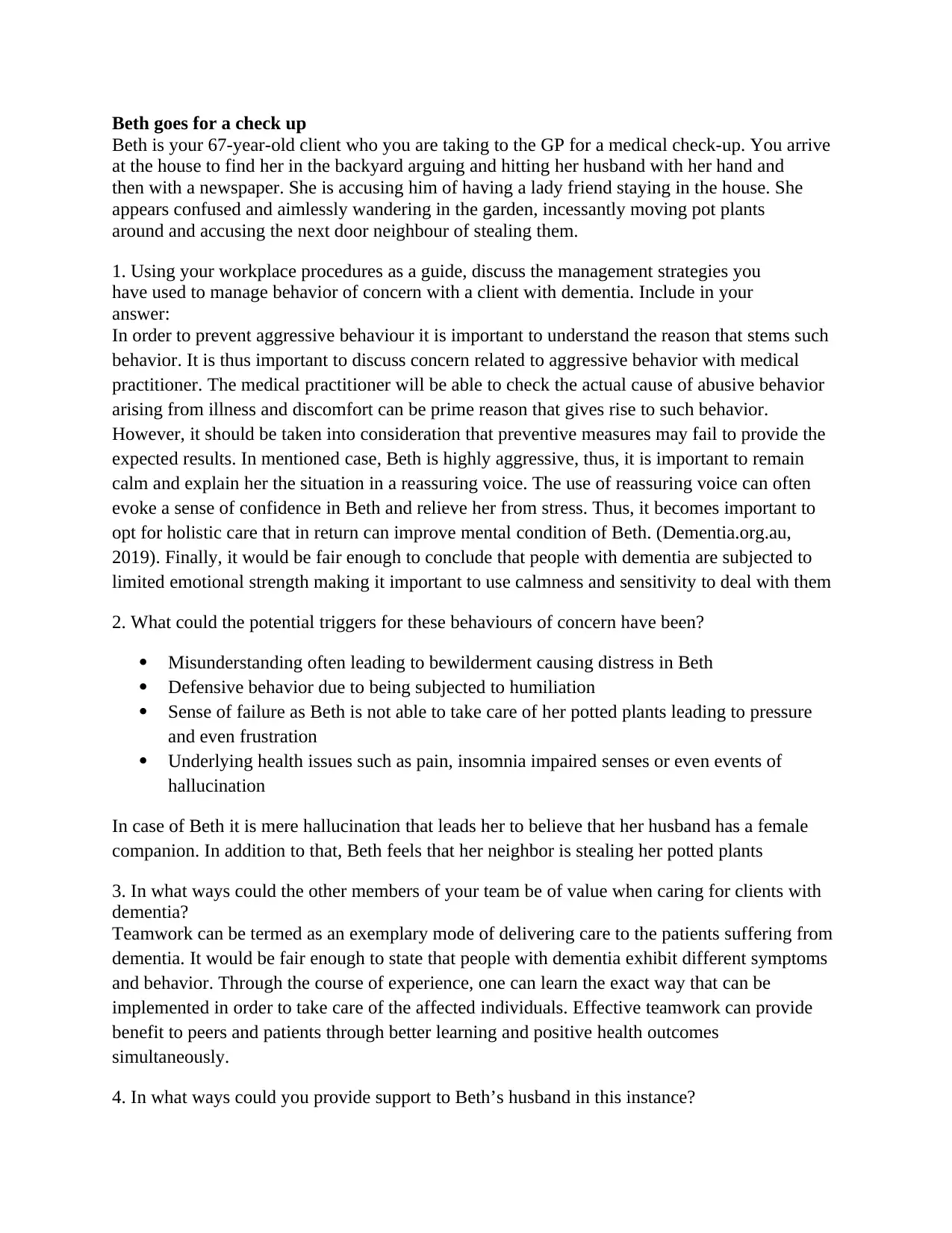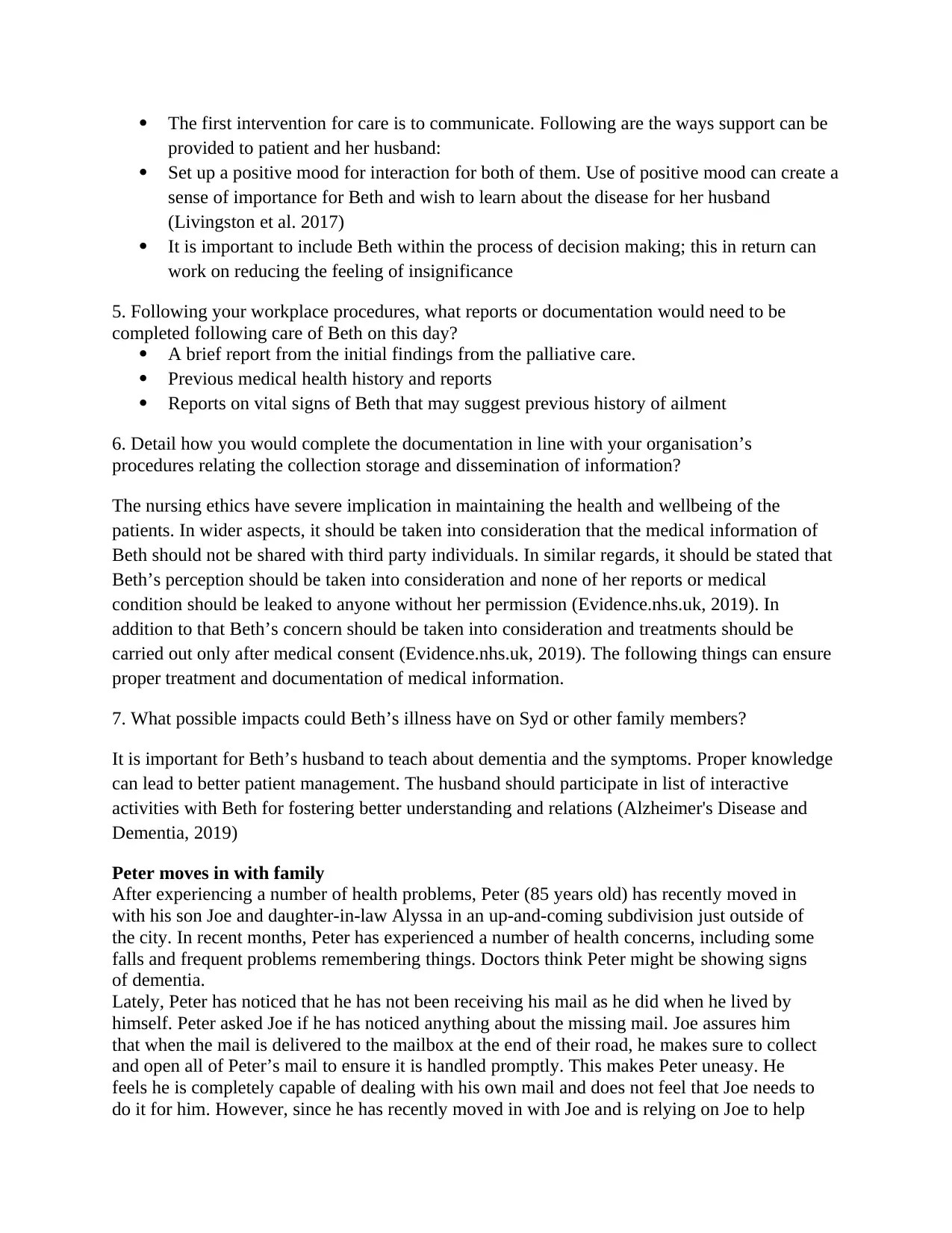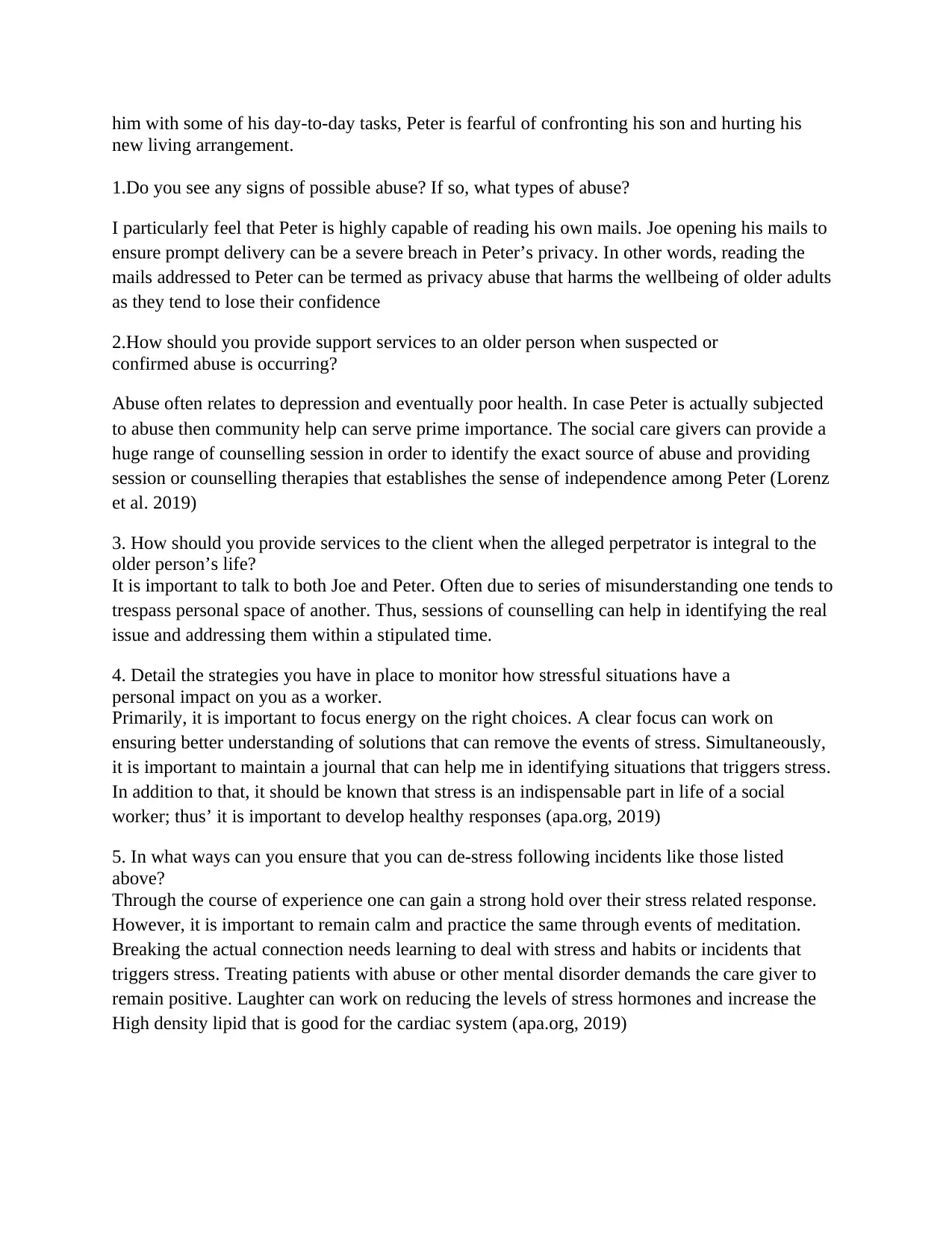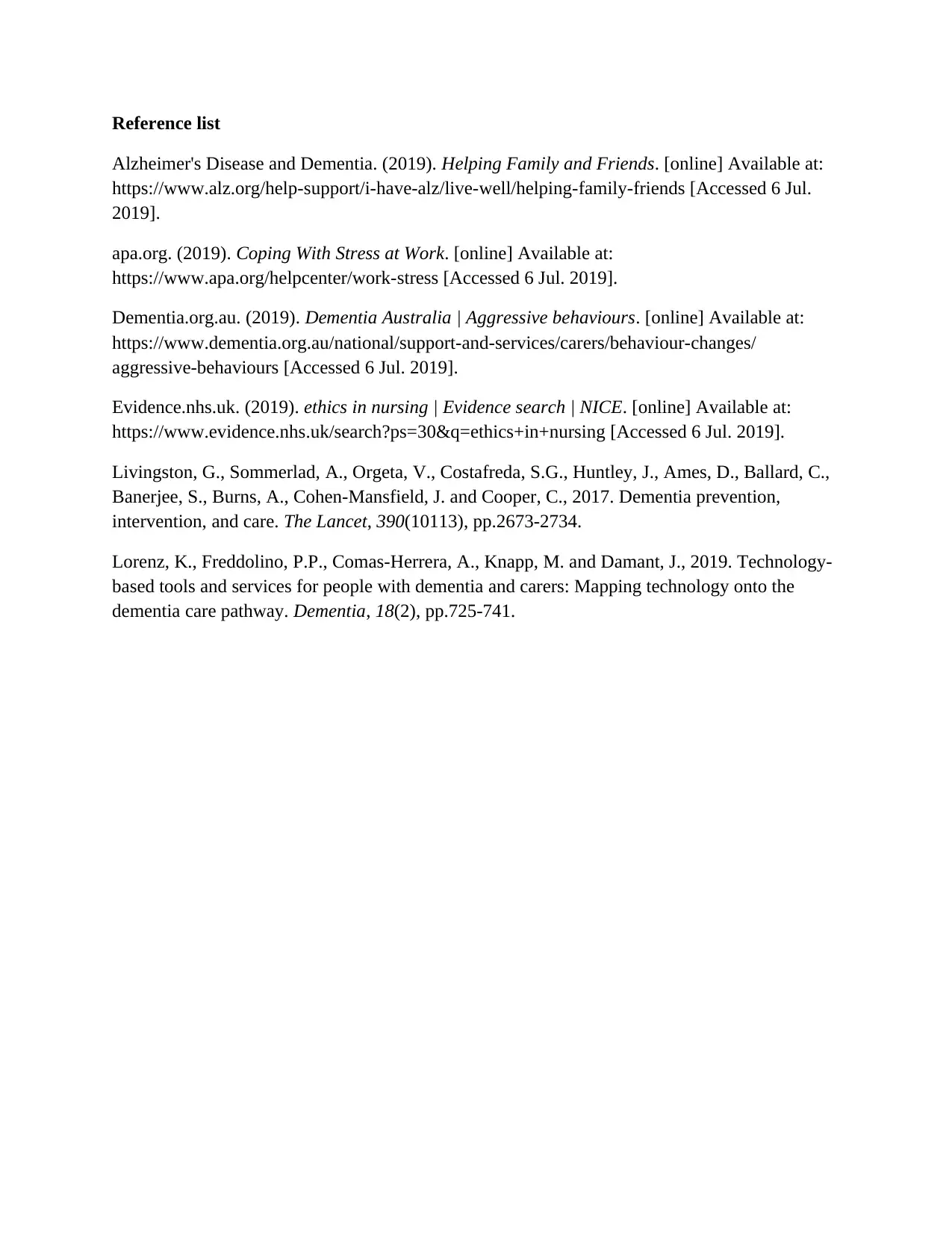Management Strategies for Aggressive Behavior in Dementia Patients
VerifiedAdded on 2022/11/24
|4
|1810
|413
AI Summary
This article discusses the management strategies for handling aggressive behavior in dementia patients, including the importance of understanding the triggers for such behavior. It also explores the role of teamwork and support services in caring for dementia patients, as well as providing support to family members. The article emphasizes the importance of proper documentation and addresses the issue of abuse in caregiving. Additionally, it offers strategies for managing stress as a caregiver.
Contribute Materials
Your contribution can guide someone’s learning journey. Share your
documents today.

Beth goes for a check up
Beth is your 67-year-old client who you are taking to the GP for a medical check-up. You arrive
at the house to find her in the backyard arguing and hitting her husband with her hand and
then with a newspaper. She is accusing him of having a lady friend staying in the house. She
appears confused and aimlessly wandering in the garden, incessantly moving pot plants
around and accusing the next door neighbour of stealing them.
1. Using your workplace procedures as a guide, discuss the management strategies you
have used to manage behavior of concern with a client with dementia. Include in your
answer:
In order to prevent aggressive behaviour it is important to understand the reason that stems such
behavior. It is thus important to discuss concern related to aggressive behavior with medical
practitioner. The medical practitioner will be able to check the actual cause of abusive behavior
arising from illness and discomfort can be prime reason that gives rise to such behavior.
However, it should be taken into consideration that preventive measures may fail to provide the
expected results. In mentioned case, Beth is highly aggressive, thus, it is important to remain
calm and explain her the situation in a reassuring voice. The use of reassuring voice can often
evoke a sense of confidence in Beth and relieve her from stress. Thus, it becomes important to
opt for holistic care that in return can improve mental condition of Beth. (Dementia.org.au,
2019). Finally, it would be fair enough to conclude that people with dementia are subjected to
limited emotional strength making it important to use calmness and sensitivity to deal with them
2. What could the potential triggers for these behaviours of concern have been?
Misunderstanding often leading to bewilderment causing distress in Beth
Defensive behavior due to being subjected to humiliation
Sense of failure as Beth is not able to take care of her potted plants leading to pressure
and even frustration
Underlying health issues such as pain, insomnia impaired senses or even events of
hallucination
In case of Beth it is mere hallucination that leads her to believe that her husband has a female
companion. In addition to that, Beth feels that her neighbor is stealing her potted plants
3. In what ways could the other members of your team be of value when caring for clients with
dementia?
Teamwork can be termed as an exemplary mode of delivering care to the patients suffering from
dementia. It would be fair enough to state that people with dementia exhibit different symptoms
and behavior. Through the course of experience, one can learn the exact way that can be
implemented in order to take care of the affected individuals. Effective teamwork can provide
benefit to peers and patients through better learning and positive health outcomes
simultaneously.
4. In what ways could you provide support to Beth’s husband in this instance?
Beth is your 67-year-old client who you are taking to the GP for a medical check-up. You arrive
at the house to find her in the backyard arguing and hitting her husband with her hand and
then with a newspaper. She is accusing him of having a lady friend staying in the house. She
appears confused and aimlessly wandering in the garden, incessantly moving pot plants
around and accusing the next door neighbour of stealing them.
1. Using your workplace procedures as a guide, discuss the management strategies you
have used to manage behavior of concern with a client with dementia. Include in your
answer:
In order to prevent aggressive behaviour it is important to understand the reason that stems such
behavior. It is thus important to discuss concern related to aggressive behavior with medical
practitioner. The medical practitioner will be able to check the actual cause of abusive behavior
arising from illness and discomfort can be prime reason that gives rise to such behavior.
However, it should be taken into consideration that preventive measures may fail to provide the
expected results. In mentioned case, Beth is highly aggressive, thus, it is important to remain
calm and explain her the situation in a reassuring voice. The use of reassuring voice can often
evoke a sense of confidence in Beth and relieve her from stress. Thus, it becomes important to
opt for holistic care that in return can improve mental condition of Beth. (Dementia.org.au,
2019). Finally, it would be fair enough to conclude that people with dementia are subjected to
limited emotional strength making it important to use calmness and sensitivity to deal with them
2. What could the potential triggers for these behaviours of concern have been?
Misunderstanding often leading to bewilderment causing distress in Beth
Defensive behavior due to being subjected to humiliation
Sense of failure as Beth is not able to take care of her potted plants leading to pressure
and even frustration
Underlying health issues such as pain, insomnia impaired senses or even events of
hallucination
In case of Beth it is mere hallucination that leads her to believe that her husband has a female
companion. In addition to that, Beth feels that her neighbor is stealing her potted plants
3. In what ways could the other members of your team be of value when caring for clients with
dementia?
Teamwork can be termed as an exemplary mode of delivering care to the patients suffering from
dementia. It would be fair enough to state that people with dementia exhibit different symptoms
and behavior. Through the course of experience, one can learn the exact way that can be
implemented in order to take care of the affected individuals. Effective teamwork can provide
benefit to peers and patients through better learning and positive health outcomes
simultaneously.
4. In what ways could you provide support to Beth’s husband in this instance?
Secure Best Marks with AI Grader
Need help grading? Try our AI Grader for instant feedback on your assignments.

The first intervention for care is to communicate. Following are the ways support can be
provided to patient and her husband:
Set up a positive mood for interaction for both of them. Use of positive mood can create a
sense of importance for Beth and wish to learn about the disease for her husband
(Livingston et al. 2017)
It is important to include Beth within the process of decision making; this in return can
work on reducing the feeling of insignificance
5. Following your workplace procedures, what reports or documentation would need to be
completed following care of Beth on this day?
A brief report from the initial findings from the palliative care.
Previous medical health history and reports
Reports on vital signs of Beth that may suggest previous history of ailment
6. Detail how you would complete the documentation in line with your organisation’s
procedures relating the collection storage and dissemination of information?
The nursing ethics have severe implication in maintaining the health and wellbeing of the
patients. In wider aspects, it should be taken into consideration that the medical information of
Beth should not be shared with third party individuals. In similar regards, it should be stated that
Beth’s perception should be taken into consideration and none of her reports or medical
condition should be leaked to anyone without her permission (Evidence.nhs.uk, 2019). In
addition to that Beth’s concern should be taken into consideration and treatments should be
carried out only after medical consent (Evidence.nhs.uk, 2019). The following things can ensure
proper treatment and documentation of medical information.
7. What possible impacts could Beth’s illness have on Syd or other family members?
It is important for Beth’s husband to teach about dementia and the symptoms. Proper knowledge
can lead to better patient management. The husband should participate in list of interactive
activities with Beth for fostering better understanding and relations (Alzheimer's Disease and
Dementia, 2019)
Peter moves in with family
After experiencing a number of health problems, Peter (85 years old) has recently moved in
with his son Joe and daughter-in-law Alyssa in an up-and-coming subdivision just outside of
the city. In recent months, Peter has experienced a number of health concerns, including some
falls and frequent problems remembering things. Doctors think Peter might be showing signs
of dementia.
Lately, Peter has noticed that he has not been receiving his mail as he did when he lived by
himself. Peter asked Joe if he has noticed anything about the missing mail. Joe assures him
that when the mail is delivered to the mailbox at the end of their road, he makes sure to collect
and open all of Peter’s mail to ensure it is handled promptly. This makes Peter uneasy. He
feels he is completely capable of dealing with his own mail and does not feel that Joe needs to
do it for him. However, since he has recently moved in with Joe and is relying on Joe to help
provided to patient and her husband:
Set up a positive mood for interaction for both of them. Use of positive mood can create a
sense of importance for Beth and wish to learn about the disease for her husband
(Livingston et al. 2017)
It is important to include Beth within the process of decision making; this in return can
work on reducing the feeling of insignificance
5. Following your workplace procedures, what reports or documentation would need to be
completed following care of Beth on this day?
A brief report from the initial findings from the palliative care.
Previous medical health history and reports
Reports on vital signs of Beth that may suggest previous history of ailment
6. Detail how you would complete the documentation in line with your organisation’s
procedures relating the collection storage and dissemination of information?
The nursing ethics have severe implication in maintaining the health and wellbeing of the
patients. In wider aspects, it should be taken into consideration that the medical information of
Beth should not be shared with third party individuals. In similar regards, it should be stated that
Beth’s perception should be taken into consideration and none of her reports or medical
condition should be leaked to anyone without her permission (Evidence.nhs.uk, 2019). In
addition to that Beth’s concern should be taken into consideration and treatments should be
carried out only after medical consent (Evidence.nhs.uk, 2019). The following things can ensure
proper treatment and documentation of medical information.
7. What possible impacts could Beth’s illness have on Syd or other family members?
It is important for Beth’s husband to teach about dementia and the symptoms. Proper knowledge
can lead to better patient management. The husband should participate in list of interactive
activities with Beth for fostering better understanding and relations (Alzheimer's Disease and
Dementia, 2019)
Peter moves in with family
After experiencing a number of health problems, Peter (85 years old) has recently moved in
with his son Joe and daughter-in-law Alyssa in an up-and-coming subdivision just outside of
the city. In recent months, Peter has experienced a number of health concerns, including some
falls and frequent problems remembering things. Doctors think Peter might be showing signs
of dementia.
Lately, Peter has noticed that he has not been receiving his mail as he did when he lived by
himself. Peter asked Joe if he has noticed anything about the missing mail. Joe assures him
that when the mail is delivered to the mailbox at the end of their road, he makes sure to collect
and open all of Peter’s mail to ensure it is handled promptly. This makes Peter uneasy. He
feels he is completely capable of dealing with his own mail and does not feel that Joe needs to
do it for him. However, since he has recently moved in with Joe and is relying on Joe to help

him with some of his day-to-day tasks, Peter is fearful of confronting his son and hurting his
new living arrangement.
1.Do you see any signs of possible abuse? If so, what types of abuse?
I particularly feel that Peter is highly capable of reading his own mails. Joe opening his mails to
ensure prompt delivery can be a severe breach in Peter’s privacy. In other words, reading the
mails addressed to Peter can be termed as privacy abuse that harms the wellbeing of older adults
as they tend to lose their confidence
2.How should you provide support services to an older person when suspected or
confirmed abuse is occurring?
Abuse often relates to depression and eventually poor health. In case Peter is actually subjected
to abuse then community help can serve prime importance. The social care givers can provide a
huge range of counselling session in order to identify the exact source of abuse and providing
session or counselling therapies that establishes the sense of independence among Peter (Lorenz
et al. 2019)
3. How should you provide services to the client when the alleged perpetrator is integral to the
older person’s life?
It is important to talk to both Joe and Peter. Often due to series of misunderstanding one tends to
trespass personal space of another. Thus, sessions of counselling can help in identifying the real
issue and addressing them within a stipulated time.
4. Detail the strategies you have in place to monitor how stressful situations have a
personal impact on you as a worker.
Primarily, it is important to focus energy on the right choices. A clear focus can work on
ensuring better understanding of solutions that can remove the events of stress. Simultaneously,
it is important to maintain a journal that can help me in identifying situations that triggers stress.
In addition to that, it should be known that stress is an indispensable part in life of a social
worker; thus’ it is important to develop healthy responses (apa.org, 2019)
5. In what ways can you ensure that you can de-stress following incidents like those listed
above?
Through the course of experience one can gain a strong hold over their stress related response.
However, it is important to remain calm and practice the same through events of meditation.
Breaking the actual connection needs learning to deal with stress and habits or incidents that
triggers stress. Treating patients with abuse or other mental disorder demands the care giver to
remain positive. Laughter can work on reducing the levels of stress hormones and increase the
High density lipid that is good for the cardiac system (apa.org, 2019)
new living arrangement.
1.Do you see any signs of possible abuse? If so, what types of abuse?
I particularly feel that Peter is highly capable of reading his own mails. Joe opening his mails to
ensure prompt delivery can be a severe breach in Peter’s privacy. In other words, reading the
mails addressed to Peter can be termed as privacy abuse that harms the wellbeing of older adults
as they tend to lose their confidence
2.How should you provide support services to an older person when suspected or
confirmed abuse is occurring?
Abuse often relates to depression and eventually poor health. In case Peter is actually subjected
to abuse then community help can serve prime importance. The social care givers can provide a
huge range of counselling session in order to identify the exact source of abuse and providing
session or counselling therapies that establishes the sense of independence among Peter (Lorenz
et al. 2019)
3. How should you provide services to the client when the alleged perpetrator is integral to the
older person’s life?
It is important to talk to both Joe and Peter. Often due to series of misunderstanding one tends to
trespass personal space of another. Thus, sessions of counselling can help in identifying the real
issue and addressing them within a stipulated time.
4. Detail the strategies you have in place to monitor how stressful situations have a
personal impact on you as a worker.
Primarily, it is important to focus energy on the right choices. A clear focus can work on
ensuring better understanding of solutions that can remove the events of stress. Simultaneously,
it is important to maintain a journal that can help me in identifying situations that triggers stress.
In addition to that, it should be known that stress is an indispensable part in life of a social
worker; thus’ it is important to develop healthy responses (apa.org, 2019)
5. In what ways can you ensure that you can de-stress following incidents like those listed
above?
Through the course of experience one can gain a strong hold over their stress related response.
However, it is important to remain calm and practice the same through events of meditation.
Breaking the actual connection needs learning to deal with stress and habits or incidents that
triggers stress. Treating patients with abuse or other mental disorder demands the care giver to
remain positive. Laughter can work on reducing the levels of stress hormones and increase the
High density lipid that is good for the cardiac system (apa.org, 2019)

Reference list
Alzheimer's Disease and Dementia. (2019). Helping Family and Friends. [online] Available at:
https://www.alz.org/help-support/i-have-alz/live-well/helping-family-friends [Accessed 6 Jul.
2019].
apa.org. (2019). Coping With Stress at Work. [online] Available at:
https://www.apa.org/helpcenter/work-stress [Accessed 6 Jul. 2019].
Dementia.org.au. (2019). Dementia Australia | Aggressive behaviours. [online] Available at:
https://www.dementia.org.au/national/support-and-services/carers/behaviour-changes/
aggressive-behaviours [Accessed 6 Jul. 2019].
Evidence.nhs.uk. (2019). ethics in nursing | Evidence search | NICE. [online] Available at:
https://www.evidence.nhs.uk/search?ps=30&q=ethics+in+nursing [Accessed 6 Jul. 2019].
Livingston, G., Sommerlad, A., Orgeta, V., Costafreda, S.G., Huntley, J., Ames, D., Ballard, C.,
Banerjee, S., Burns, A., Cohen-Mansfield, J. and Cooper, C., 2017. Dementia prevention,
intervention, and care. The Lancet, 390(10113), pp.2673-2734.
Lorenz, K., Freddolino, P.P., Comas-Herrera, A., Knapp, M. and Damant, J., 2019. Technology-
based tools and services for people with dementia and carers: Mapping technology onto the
dementia care pathway. Dementia, 18(2), pp.725-741.
Alzheimer's Disease and Dementia. (2019). Helping Family and Friends. [online] Available at:
https://www.alz.org/help-support/i-have-alz/live-well/helping-family-friends [Accessed 6 Jul.
2019].
apa.org. (2019). Coping With Stress at Work. [online] Available at:
https://www.apa.org/helpcenter/work-stress [Accessed 6 Jul. 2019].
Dementia.org.au. (2019). Dementia Australia | Aggressive behaviours. [online] Available at:
https://www.dementia.org.au/national/support-and-services/carers/behaviour-changes/
aggressive-behaviours [Accessed 6 Jul. 2019].
Evidence.nhs.uk. (2019). ethics in nursing | Evidence search | NICE. [online] Available at:
https://www.evidence.nhs.uk/search?ps=30&q=ethics+in+nursing [Accessed 6 Jul. 2019].
Livingston, G., Sommerlad, A., Orgeta, V., Costafreda, S.G., Huntley, J., Ames, D., Ballard, C.,
Banerjee, S., Burns, A., Cohen-Mansfield, J. and Cooper, C., 2017. Dementia prevention,
intervention, and care. The Lancet, 390(10113), pp.2673-2734.
Lorenz, K., Freddolino, P.P., Comas-Herrera, A., Knapp, M. and Damant, J., 2019. Technology-
based tools and services for people with dementia and carers: Mapping technology onto the
dementia care pathway. Dementia, 18(2), pp.725-741.
1 out of 4
Your All-in-One AI-Powered Toolkit for Academic Success.
+13062052269
info@desklib.com
Available 24*7 on WhatsApp / Email
![[object Object]](/_next/static/media/star-bottom.7253800d.svg)
Unlock your academic potential
© 2024 | Zucol Services PVT LTD | All rights reserved.